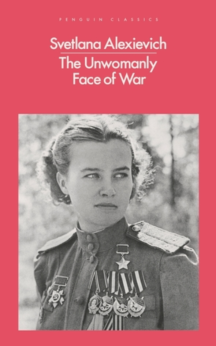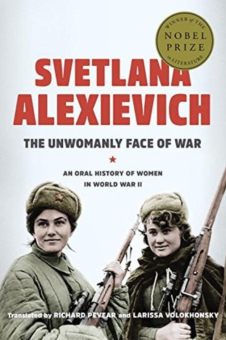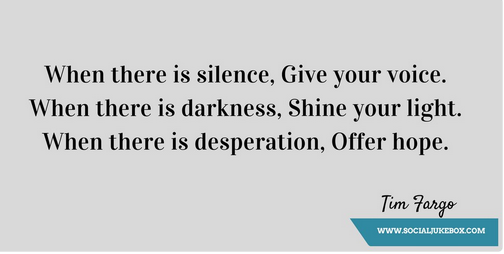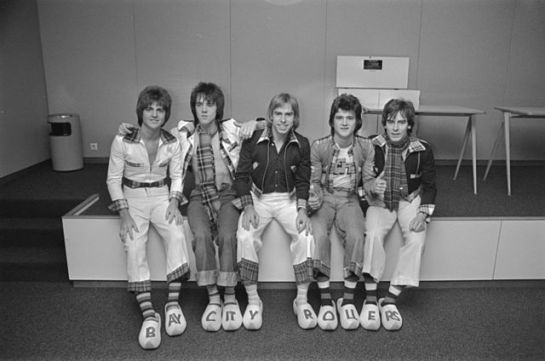CN: book contains rape, graphic violence.
 I did not expect to devour this book the way I did. Of all the books that I’ve ever felt compelled to consume greedily and compulsively–of all the books that I’ve ever sat down with intending to read for only a few minutes, only to re-emerge several hours later–I never thought The Unwomanly Face of War would be one of them–a chunky oral history of the Second World War as seen through the eyes of ordinary Soviet women, containing a fair share of harrowing narratives and general bleakness, and translated into an English that’s still a little bit Russian. And yet, here we are. Though extremely positive, other reviews have called it “an oratorio of horror”, a “stomach-churning danse macabre”, and “a tough read, both emotionally and intellectually” (and have said that “those who aren’t at least somewhat familiar with Russian grammar may feel left out in a few spots”)–but I found it ridiculously readable.
I did not expect to devour this book the way I did. Of all the books that I’ve ever felt compelled to consume greedily and compulsively–of all the books that I’ve ever sat down with intending to read for only a few minutes, only to re-emerge several hours later–I never thought The Unwomanly Face of War would be one of them–a chunky oral history of the Second World War as seen through the eyes of ordinary Soviet women, containing a fair share of harrowing narratives and general bleakness, and translated into an English that’s still a little bit Russian. And yet, here we are. Though extremely positive, other reviews have called it “an oratorio of horror”, a “stomach-churning danse macabre”, and “a tough read, both emotionally and intellectually” (and have said that “those who aren’t at least somewhat familiar with Russian grammar may feel left out in a few spots”)–but I found it ridiculously readable.
It definitely helps that the book is divided into relatively short chapters (each with a theme), which are themselves usually divided into individual stories that tend to be no longer than a page or so. But, also, with the exception of one or two genuinely all-round grim chapters (particularly the one about partisan women), I found The Unwomanly Face of War more moving than depressing. Alexievich’s skill as an interviewer and editor is such that you don’t just feel sadness, you don’t just feel horror, or anger, or outrage, but all the emotions–the more horrific episodes are simply part of a broader, richer tapestry of human experience. After all, in writing this book, revealing the true horrors of war was not Alexievich’s main aim: rather, she wanted to give voice to the women who’d fought in the war but who’d been subsequently silenced due to the usual patriarchal reasons, and she’d also wanted write “the history of small human beings, thrown out of ordinary life into the epic depths of an enormous events”. Inevitably, then, we also read about friendship, and love, and self-care, and we even get a few thrilling tales of adventurous derring-do. In one of my favourite passages, an ex-underground fighter names Tamara Ustinova Vorobeykova recalls how her friends, and movies, helped her overcome her PTSD:
But the girls–my roommates in the dormitory–told me to forget about the doctors, and took me under their patronage. Every night they took turns dragging me to the movies to watch a comedy. ‘You have to learn to laugh. To laugh a lot.’ Whether I wanted to or not, they dragged me. There weren’t many comedies, and I watched each one a hundred times, a hundred times at a minimum. At first when I l laughed it was like crying . . . But the nightmares went away. I was able to study . . .
 As for Pevear and Volokhonsky’s English, it’s true that it’s stiff and spiky in places–but I think, first, that it is never so stiff and spiky that it detracts from the book’s momentum, and, second, that its somewhat awkward, somewhat unpolished nature actually goes quite well with the book’s content. After all, the bulk of the book consists of transcripts of oral interviews, and people don’t talk like books, they talk like people, with grammatical errors, idiosyncratic phrases, sentences that go nowhere, funny accents, and so on. And the small percentage of the book that it isn’t interview transcripts consists of Alexievich’s own introductory musings, both to the book as a whole and to each individual chapter, which are often meandery, and feel like they’ve been lifted from her personal diaries–in fact, some of them are. Pevear and Volokhonsky’s English is perfect for conveying the oral nature of the book’s source material, and the loosely informal nature of Alexievich’s introductions. You want to almost detect a Russian accent in this sort of book.
As for Pevear and Volokhonsky’s English, it’s true that it’s stiff and spiky in places–but I think, first, that it is never so stiff and spiky that it detracts from the book’s momentum, and, second, that its somewhat awkward, somewhat unpolished nature actually goes quite well with the book’s content. After all, the bulk of the book consists of transcripts of oral interviews, and people don’t talk like books, they talk like people, with grammatical errors, idiosyncratic phrases, sentences that go nowhere, funny accents, and so on. And the small percentage of the book that it isn’t interview transcripts consists of Alexievich’s own introductory musings, both to the book as a whole and to each individual chapter, which are often meandery, and feel like they’ve been lifted from her personal diaries–in fact, some of them are. Pevear and Volokhonsky’s English is perfect for conveying the oral nature of the book’s source material, and the loosely informal nature of Alexievich’s introductions. You want to almost detect a Russian accent in this sort of book.
In short, I would highly recommend this book, and not just to history buffs, but to anyone who wants to read a complex story with a huge cast of characters that will make you feel all the emotions you are capable of feelings. And if you came to this review having already read the book and looking for recommendations for similar books, I’d direct you to Laird Hunt’s Neverhome, a slim novel about a woman who fights in the American Civil War disguised as a man, and Karen Abbott’s Liar, Temptress, Soldier, Spy, which also focuses on women in the American Civil War but from a non-fiction perspective.
Advertisements Share this:





